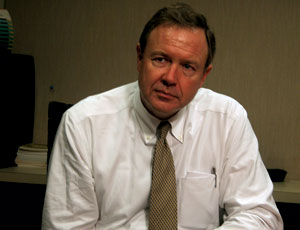Putting problem projects, corruption settlements and a bumpy association with Halliburton behind, KBR Inc. is trying to carve a new role as a global engineering and construction player, with a focus on energy and industrial megaprojects, said William P. Utt, chairman, president and CEO, in a wide-ranging interview with ENR editors. But he noted that the Houston-based firm is still committed to military and government support work even as it faces continuing questions related to work in Iraq.

It has been two years since KBR was spun off from its 44-year association with Halliburton, dating back to its contractor predecessor, Brown & Root. Utt is mopping up some legacies of that linkage while using a billion-dollar war chest to propel the firm into some new markets and capabilities.
Utt, 52, joined KBR as president and CEO in 2006, becoming chairman after the split. A mechanical engineer with a University of Virginia MBA, he also is a management veteran of CRS Sirrine Engineers and ran global energy businesses for Tractebel and Suez North America. “We are really a different KBR than people remember from being part of Halliburton,” said Utt. “The last three years have been an era of transition and restructuring. We have tried to remake the company into what we really want to be.”
Utt noted that Halliburton’s zeal for high margins pushed KBR into “risky, lump-sum turnkey projects internationally.” He said that while the firm thrived on such work, it proved costly. “We had a rich legacy of having some spectacularly bad projects, from a financial standpoint,” Utt said, noting big writeoffs on such projects as a rail line in Australia and a $120-million U.S. embassy in Skopje, Macedonia, that was bid at half the price. Utt added that the emphasis caused “atrophy” in KBR’s construction and maintenance businesses, which he terms “high volume, but traditionally lower margin.”
Halliburton was “a good parent,” but the two entities “were like oil and vinegar,” said Utt. “We are glad to be here now, and they are glad we are gone,” he said. “We have both done better since.”
According to Utt, several engineering and construction acquisitions have helped propel KBR’s metamorphosis, particularly the 2008 buyout of nonunion industrial contractor BE&K Inc., Birmingham, Ala. “It was a chance to demonstrate to our customer base that we were sincere about getting back into the North American construction business,” he said.
The strategy appears to be paying off, with KBR reporting on July 30 that revenue for the first six months of 2009 rose 22% over the same period a year ago. Income was up 15% during that same time, with a $12.3-billion backlog and “no material project cancellations,” the firm said. Utt noted that more acquisitions are likely as the firm eyes moving into the nuclear- power sector and into new arenas of government work, such as for the federal energy and homeland security departments. “We would like to move up the value chain to have a full EPC offering,” Utt said.
Utt noted strong growth potential in KBR’s oil and gas business, noting recent liquefied-natural-gas project awards in the Gulf of Mexico and North Sea, including work it hopes will provide subsea design and construction capability. He also noted growth in the firm’s “downstream” markets, with new activity in its work at the giant Yanbu refinery in Saudi Arabia and at two smaller ones in Africa.
Utt said he is committed to KBR’s military support work, despite the U.S. Army’s recent decision not to award the firm either of two major task orders in Afghanistan under its Logistics Civil Augmentation Program (LOGCAP) IV contract won last year. Teams led by Fluor Corp. and DynCorp International won them. Ever the pragmatist, Utt said KBR will not protest the award, as it has done with past contract decisions. “If the military’s mind is made up, that is fine,” he said. “The Pentagon is under pressure. A lot of it is political. Until they see someone else’s performance in theater and are able to compare it to what KBR has done, only then will people understand whether we are good or not.”
Utt noted that KBR’s LOGCAP III contract in Iraq, under which it has faced lawsuits and angry politicians stemming from soldier fatalities allegedly due to shoddy work, is the firm’s lowest profit contract. But questions of KBR’s culpability and liability as a military contractor are still being debated. In June, a federal appeals court in Atlanta said contractors under the U.S. military’s direction are not liable in civil lawsuits for actions taken under battlefield conditions, but plaintiffs are likely to fight the ruling.
Utt defended KBR’s record in military support, noting a recent top rating from the U.K. defense ministry for separate work in Afghanistan and the Gulf region and citing the firm’s 130 employee casualties under LOGCAP III. “We have had a lot of people pay the ultimate sacrifice,” he said.






Post a comment to this article
Report Abusive Comment